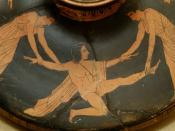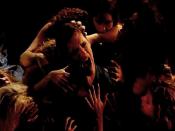It is understood and recorded that in nature and the real world many people, animals, and objects undergo tremendous transformations shaping their outcome in life as well as the views of others. These transformations are prompted by many things such as environmental changes, physical changes, or emotional changes. Other times, the transformation is a result of oppression or threats to one's character or persona. In the play The Bacchae, written by Euripides, Dionysus is the god of wine and nature and a son of Zeus. He experiences a significant transformation from being fairly harmless in the beginning of the play to becoming a force so powerful and vengeful that even his own mother and grandfather were exiled for not believing in him.
The fact that Dionysus seems quite compliant and not likely to cause any harm in the second and third episodes of The Bacchae is a result of Pentheus's constant berating and sarcasm.
Dionysus somehow represents all that is non-rational, intuitive, and natural. Pentheus on the other hand represents a sort of evidential, controlling, "eyes wide open" world. These two individuals are opposites, and therefore while Pentheus taunts and teases Dionysus, he stands before him, taking in everything Pentheus says and answering back with remarks twice as clever: "What will he say/ After this?/ Let him come out snorting tempests,/ I shall be the soul of peace./ A cool detachment is the thing/ For a man of wisdom-eh?" (640-644).
Dionysus is already wearing down his enemy using no violence at all, only clever tactics.
Dionysus begins his change in the third episode, after the herdsman enters and tells Pentheus of all the chaos the Bacchic women are administering in the hills. One can tell that the god Dionysus is getting a bit agitated that Pentheus will not succumb...


